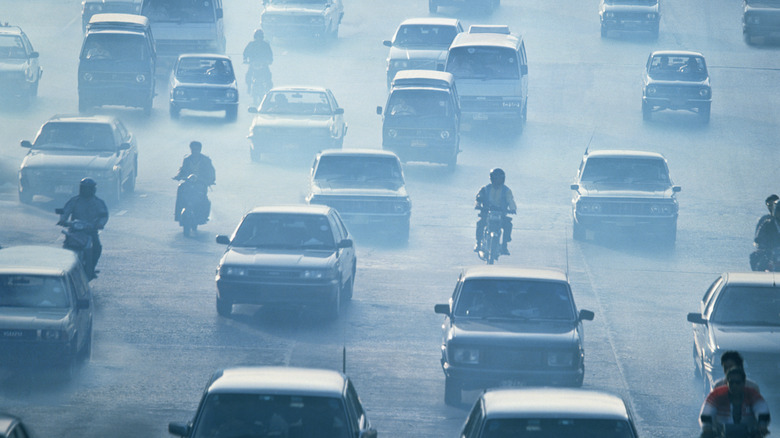Can You Taste Air Pollution In Your Food?
If you've ever lived in a city where air pollution levels were dangerously high, then you'll know how much pollution can hit you like a sensory assault. Smoke from wildfires can make your eyes water and your throat flame up, and air thick with car exhaust fumes can leave a sharp tang of gasoline in your nose. Our senses are so intertwined that what we smell in particular can really hit us in our tastebuds. But could air pollution really have a tangible effect on how you taste your food?
An experiment from the Center for Genomic Gastronomy set out to find out in 2011. The Smog Tasting project traveled to some of the most highly polluted cities in the world, making the same recipe in each place (sometimes in different neighborhoods within the same city), to prove that air quality can have a noticeable effect on how you perceive the flavor of a dish.
Smog meringue
The Smog Tasting project used meringue as its test subject, since whipped egg white foam is 90% air, in essence trapping air molecules from the surrounding environment in something that could be consumed. Areas with ammonia-laden pesticides produced meringues with a sour taste, while sulfurous air in places with a high volume of cars (and thus, exhaust) produced a gritty, stinging meringue.
The group experimented across cities with varying types of pollution, like London, with its famous smog, and Bangalore and Mumbai in India, where burning trash and constant construction fill the air with toxic particles.
While the project was constructed more as a type of performance art than as a scientific research project, it was an effective way of teaching city dwellers about the risks air pollution poses. After all, once you've eaten the smog meringue, it's a lot harder to ignore the daily pollution infiltrating every corner of your life.
Toxins can reduce your sense of taste
Unfortunately, not all pollutants present themselves to the senses as obviously as ammonia or sulfur. Some pollutants, like carbon monoxide, have no smell or taste, and can be produced in excess by common household appliances like gas stoves and water heaters.
Long-term exposure to chemicals in the air can also morph or deteriorate your sense of taste and smell over time. In a 1981 study published in Med Pr., petroleum refinery workers tested over the course of a few years showed signs of reduced perception of taste, as well as high levels of dysgeusia, a disorder that warps the sense of taste in favor of bitter, sour, and metallic flavors.
Even your sense of hearing can impact your sense of smell, which is particularly impactful on individuals in loud, traffic-filled cities or chaotic construction sites where air pollution is common. According to a 2011 study in Food and Quality preference, loud noises can cause us to be less receptive to sweet and salty flavors, even further modifying our culinary experience through both air and noise pollution.



